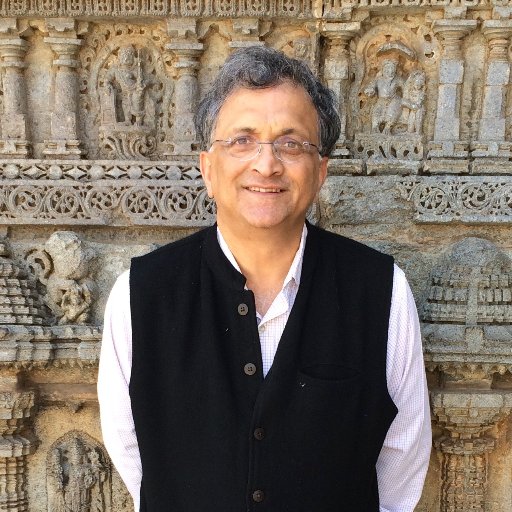
Satish Verma
@satoverma
Followers
8K
Following
49K
Media
510
Statuses
17K
Committed to Engineering. Having affairs with Philosophy. Aspiring polymath. https://t.co/OTbpbznSdK
Joined September 2010
For the people interested in exploring the works of the great Prof. Vasudeva Sharana Agrawala, you can download the complete bibliography published by IGNCA using this link. He is perhaps the foremost scholar on Indian art, history and religion of 20th c. https://t.co/BiyLVTKW4u
8
32
162
Cooperation has been the dominant norm amongst the Hindu castes and that theoretical framework has to be built painstakingly so that scholars have alternative frameworks available to end the menace of existing ones.
0
0
13
For instance, while understanding the interaction between Islam and Hinduism, conflict is the dominant theme because Islam was the aggressor and there is no merit in finding cooperation here. In contrast, Hindu castes haven't been in permanent war with each other eternally.
1
0
8
What we need is a new theoretical framework to understand Indian society that doesn't necessarily impose conflict or cooperation in every circumstances. We need to understand where cooperation is the dominant theme and where conflict reigns supreme.
1
2
6
Of course, there is a history behind why only conflict view of Indian society gets prominence and colonial scholarship is one of the major factors. But we are not going to solve the problem of wrong theoretical framework by studying Britain or any other society using the same.
1
0
7
The dominant themes in all such narratives is a conflict based one. Cooperation seldom attracts their fancy. So, castes are locked against one another, the evil baniya capitalists against labour, Hindu extremists against passive Muslim minority and so on.
1
0
7
industrialized societies (cf. E B Tyler's characterization of Indian society as living fossil). There are other minor frameworks such as the ones that see Indian society being defined by conflict of religions, subaltern view of history etc.
1
0
6
When it comes to the study of Indian society, the dominant frameworks available are primarily: 1. A society defined by interaction of castes where conflict is the primary mode of interaction 2. A society defined by class warfare (Marxist one) 3. A primitive society vis-a-vis +
1
0
6
When one studies something as complex as human society, one always has to rely on some or other theoretical frameworks to provide a coherent view and make sense of myriad of seemingly unrelated set of observations. Without theoretical frameworks, it becomes merely a reportage.
1
0
7
While sentimentally correct, this is a wrong analysis of the situation and evades the key issues. The key issue is the theoretical framework used to study any society. Even if one were to analyze Indian academics working on India, caste would the most prominent one.
More data mined through Perplexity Pro. In the last 75 years, 400-600 British academics based in the UK have worked in caste in India. In the same period, less than 10 Indian academics working in India researched class/race in Britain. This is how BIG epistemic colonialism is.
1
4
15
One of the worst cults to emerge in recent times. Once someone joins their cult, they force the person to bring other family members into their fold creating rift. They ask their members to abandon the worship of even their family deities. Very good work by @PrateekUvacha here.
Brahma Kumaris: God's Daughters or A Mind-Control Cult? Behind their white sarees and talk of peace lies a powerful network accused of mind control, breaking of families, and sexual misconduct. But what's the truth? In this video, I reveal WHAT BRAHMA KUMARIS DON'T WANT YOU TO
10
70
351
Four books that have profoundly shaped my political thinking.
6
37
311
This is how Google scholar page of "country's foremost anthropologist" looks like in recent times. Indian leftists don't even pretend to be academic anymore and the likes of Guha try elevating Maoist political workers as scholars. Nandini Sundar remains a Maoist, nothing else.
Professor @nandinisundar is perhaps the country's foremost anthropologist. In this important interview with @kunalkamra88 she discusses the attacks on tribal lands and livelihoods by the state and corporate interests: https://t.co/x6GbUIephk via @YouTube
12
187
552
This is how one contributes to understanding of a language and takes it to both the masses and scholars alike, instead of engaging in subversive scholarship which is just a collection of a slew of citations that don't contribute to our understanding of subjects in meaningful way.
0
3
31
On a related note, I received the collected works of Acharya Hajari Prasad Dwivedi in 12 volumes today. 6000+ pages of writing in Hindi – covers the arc from novels, literary studies, affinity between Kalidasa and Tagore to historical development of Hindi vocabulary.
Publishing a routine work on how Hindi was the vehicle of Hindu nationalism and marginalization of Muslims helped our understanding of Hindi in the same way as Vito Corleone's career in The Godfather helped us understand the international trade of olive oil.
6
35
168
Publishing a routine work on how Hindi was the vehicle of Hindu nationalism and marginalization of Muslims helped our understanding of Hindi in the same way as Vito Corleone's career in The Godfather helped us understand the international trade of olive oil.
Few have shaped our understanding of Hindi and North Indian literary cultures like Francesca Orsini. To know she’s been denied entry into the country she’s written about with such love and rigour feels deeply wrong.
21
204
874
Nothing makes me happier than seeing Thomas Sowell in such good health at the age of 95. And Peter Robinson is always the finest interviewer for such discussions. I've enjoyed their interviews over the years whenever Sowell came up with a new book.
NOW LIVE: Uncommon Knowledge's most requested guest, Hoover Senior Fellow Thomas Sowell, joins @P_M_Robinson for a very special episode. Rather than discussing his many books, Dr. Sowell shares the full arc of his American story. Watch the full conversation via @UncKnowledge:
2
2
39
To quote Naipaul verbatim, "The Raj was an expression of the English involvement with themselves rather than with the country they ruled." Doyle masterfully dealt with this theme even though he was primarily a supporter of the British empire.
0
2
24
This theme was also recognized by Naipaul in his book 'An Area of Darkness'. While doing a survey of the British literature after Dickens, Naipaul noted that anything written about Raj by English authors is grander than the reality. It appears as if they're deceiving themselves.
1
3
18
Through Barclay, Doyle challenges the narrative that was built by British writers such as Kaye, Seele, JS Mill and others regarding the role of Raj and its character in India. Doyle deals with the fiction that the British writers created about the Raj and themselves in India.
1
0
10
The facts that are known to people regarding Col. Barclay's life are perfectly aligned with the national character that the likes of Kaye portrayed. But in reality, Barclay betrayed his own brother-in-arms and his commission was primarily due to his father-in-law.
1
0
10






